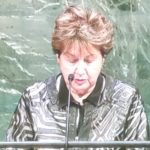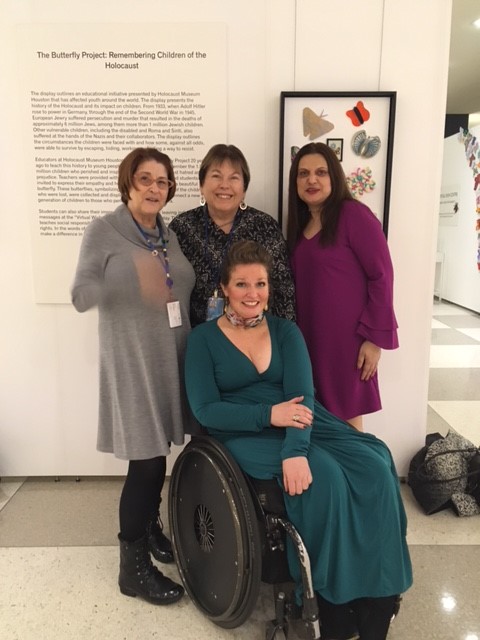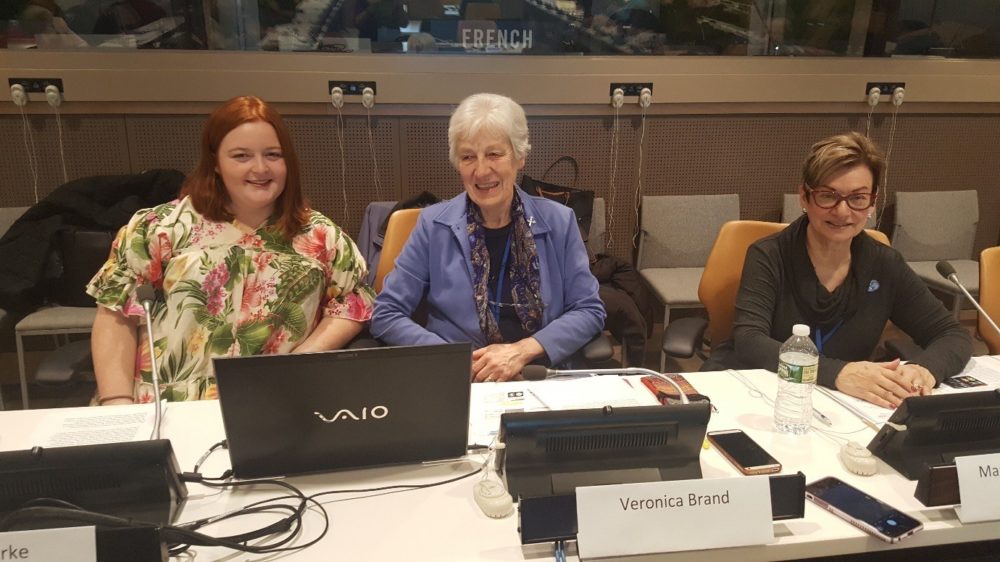Welcome to the new edition of ‘Your Voice at the United Nations’
Day of Commemoration in Memory of the Victims of the Holocaust
by: Sandy Hecker, SI UN Representative, New York

Photo: Ms Alison Smale
During the past four years I have attended an annual event on 31 January 2018 in the General Assembly Hall. This year’s programme was ‘Holocaust Remembrance and Education: Our Shared Responsibility’. Master of Ceremony was Under-Secretary-General for Global Communications, Ms. Alison Smale. Speakers included UN Secretary-General Antonio Guterres, President of the 72nd session of the UN General Assembly, H.E. Mr. Miroslav Lajcak, Permanent Representative of Israel to the UN, H.E. Mr. Danny Danon, Permanent Representative of Germany to UN, H.E. Mr. Christoph Heusgen, US Representative to ECOSOC at the UN, Holocaust Survivor Mrs. Eva Lavi, Keynote Speaker Judge Thomas Buergenthal, and Cantor Joseph Malovany from Fifth Avenue Synagogue gave the Recitation of Memorial Prayers.
Every year there are less living survivors of the Holocaust to give us first-hand accounts of the atrocities and how they survived while entire families were killed sometimes in front of them. Mrs. Eva Lavi witnessed her twin cousins being shot to death. She was the youngest child on Schindler’s List and rescued shortly before she was to be executed by the Nazis.
All spoke on the rise of anti-Semitism and the urgency to find strategies to prevent and combat hate. Mr. Heusgen spoke on the rights of migrants and refugees. They are in horrific conditions and face increasing intolerance and hate as they struggle to survive in displaced camps, or in their journey to find a nation for a temporary, and perhaps a permanent home. Ambassador Danon talked about Israel’s successes in transforming dirty and contaminated water into drinking water. The knowledge can bring relief to many in water-starved nations. Perhaps the most compelling moments are the faces of the young in the audience as they listened to the survivor’s accounts. To understand, all must share in the responsibility to remember and educate others, so no one forgets. To be steadfast as we work towards stopping genocide in every nation.
The Butterfly Project

Photo: Bette Levy, SI UN Representative, New York; Beverly Bucur, SI Director of Advocacy; Kerry M. Gibson, President of Ecocentury Technologies, Inc. and Mandy Sanghera, international human rights activist and Tedx presenter at the Butterfly Project at the UN in New York.
 In conjunction with the Holocaust observance, the United Nations hosted an exhibit of handmade butterflies made by children from six continents over the last two decades to memorialize the 1.5 million children who perished in the Holocaust. The display, which opened Tuesday, 23 January, in the United Nations Visitors’ Lobby, represented a portion of the 1.5 million butterflies contained in Holocaust Museum Houston’s “The Butterfly Project: Remembering the Children of the Holocaust” and is presented as part of the United Nations’ observance of The International Day of Commemoration in memory of the victims of the Holocaust.
In conjunction with the Holocaust observance, the United Nations hosted an exhibit of handmade butterflies made by children from six continents over the last two decades to memorialize the 1.5 million children who perished in the Holocaust. The display, which opened Tuesday, 23 January, in the United Nations Visitors’ Lobby, represented a portion of the 1.5 million butterflies contained in Holocaust Museum Houston’s “The Butterfly Project: Remembering the Children of the Holocaust” and is presented as part of the United Nations’ observance of The International Day of Commemoration in memory of the victims of the Holocaust.
Take The Butterfly Project Pledge. This is your individual commitment to action to create lasting impact. http://butterflies.hmh.org/about/take-the-pledge/
New York UN Representative, Sandy Hecker, is a member of the Working Group on Girls (WGG). Sandy reports on Cyberbullying and Cybersecurity.
On 1 February, the Committee on Girls against Violence invited Mr. Paul A. Ferrillo a counsel in Weil, Gotshal, & Manges LLP, where he is part of Cybersecurity, Data Privacy, and Management practice, and one of seven of the CyberAvengers team, to give a presentation on cyberbullying and cybersecurity with a panel of girl activists asking questions.
Mr. Ferrillo gives presentations at schools in Long Island, NY because, as a father, he is concerned for his children’s safety. Girls are the most vulnerable and are bullied more than boys. Girls are targeted for prostitution and trafficking. Parents must have an ongoing dialogue with their children so when they are stalked, harassed, or online bullied, they feel comfortable to tell them. Parents should be aware what sites their children are visiting and the parent control necessary. Schools need better strategies to deal with cyberbullying. Social media sites should not have personal information such as one’s birthday. Do not provide sites with social security numbers. Children’s photographs should not be online because of the many pornography sites. Mobiles are easily hacked so be careful with online banking. All must be security smart in an age where there is too much personal information online. Protect yourself and your children.
CSocD Side Event Strategies for Poverty Eradication: Grassroots take on SDG Awareness and Implementation
By: Marie D’Amato-Rizzi, SI UN Representative, New York

Marie moderated on a side event on 6 February that explored the issue of poverty through the lens of affected communities as well as their experience of the most recently reviewed SDGs (1, 2, 3, 5, 9, 14, 17). The event considered the experiences of the grassroots communities in terms of the level of awareness of the SDGs that reach their respective areas, and how they view the implementation by various actors in relation to their contexts, as well as what they think are the strategies that would work.
Results were based on a survey conducted in 2017 by the NGO CSocD Grassroots Task Force, of persons from the 44 countries which participated in the Voluntary National Review. This side event presented the findings and strategies emerging from the survey as well as stories from the Grassroots about participatory implementation of the SDGs as a means of eradicating poverty.
Key messages: Whilst most of the organizations surveyed had heard of the SDGs, they did so from non-governmental sources such as social media and less than half thought the population was generally aware of the new agenda. Respondents in 28 of the 44 countries doing their VNRs in 2017 indicated that “a little progress” has been made in implementing the SDGs. A majority of those working at the grassroots level said they were unaware of new government and/or NGO partnerships related to the Goals.
Poverty eradication strategies/social policy recommendations/commitments/initiatives:
- More use should be made of television and radio to discuss the SDGs. Radio should be emphasized in rural areas
- Put more emphasis on the important roles NGOs and CSOs can play in the SDGs
- Initiate awareness programs in schools to reach children. This engages the next generation but also leads to sharing information with parents
- Translate the SDGs into local languages
- Use village meetings for information sharing
- Use traditional communication forms including dance, puppet shows, and street theatre
- SDG implementation should be closely integrated into national and local planning. Greater coherence is needed
- Corruption needs to be tackled and accountability strengthened
- Governments should act as “enablers” recognizing existing NGO initiatives on the ground and inviting them to collaborate with them in SDG implementation
- More financial and technical support should be made available to scale up successful grassroots initiatives that cater to the most marginalized in society
- Best practices in implementation of the SDGs should be widely shared and disseminated
CSocD Side Event ‘Eradicating Poverty: a Workshop on the Role of Global Citizenship’, hosted by the Coalition for Global Citizenship 2030 and Sponsored by Soroptimist International and UNDP.
By Vanesa Treers
In order to be truly sustainable, long-term poverty alleviation requires the underpinning values of global citizenship. CGC2030 works to engage member states, UN agencies, and civil society in dialogues that broaden and deepen our understanding of Global Citizenship and to champion its role in realizing the 2030 Sustainable Development Agenda. In support of our collective journey toward “poverty eradication and sustainable development for all,” we should explore how the values and ethical principles enshrined in the concept of Global Citizenship contribute to a fundamental framework for transformation, Dr. Joni Carley, Vice Chair, Coalition Global Citizenship 2030.

This year, the fifty-six session of the Commission for Social Development, prioritised “strategies for eradicating poverty to achieve sustainable development for all. The Coalition for Global Citizenship, sponsored by Soroptimist International, undertook a workshop at the UN premises where involved participants and panelists on a dialogue to explore frameworks and systems that promote Global Citizenship values.
Mr. Babatunda Omilola, Head of Development Planning and Inclusive Sustainable Growth Team UNDP argued that Inclusive growth needs three basic multidimensional components, a multisectoral growth that covers all aspects of the human being, employment opportunities, and sustainable measures. Inclusive growth is at the heart of UNDP and pays special attention to women. Their women’s projects for inclusion argued for more supporting mechanisms, such as reduce women’s unpaid work, women’s equal access to employment opportunities and financial resources, and national gender-sensitive budget processes, to promote the inclusion of women as necessary elements for poverty eradication and sustainable development.
An additional component discussed at the event was education and its importance in tackling inequalities. Knowledge of our rights as human beings, regardless of our nationality or race, is a practice that promotes global citizenship values. Understanding that “rights” don’t come from the state is paramount for Mr. Jonathan Granoff, President of Global Security Institute. He called upon all ministers of education to include the Declaration of Human Rights as a main aspect of school curriculums. For many girls and boys, education sends a strong message of their state’s sovereignty, without prioritising the rights of human dignity and freedom.
Overall, it was agreed that mechanisms that promote inclusion, and education that promotes knowledge of our fundamental rights as humans and, enhancing values that remind us we are all part of humanity, are ways to exercise global citizenship. Global citizenship is not given nor taken, it is a value-based practice that enhances equality of all human beings and promotes inclusion for all”.

